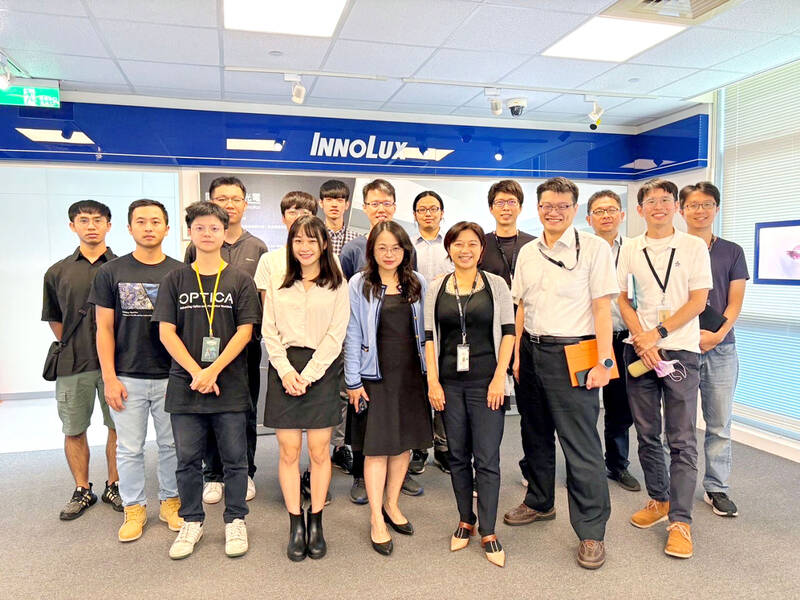A National Yang Ming Chiao Tung University (NYCU)-led international research team has developed the world’s first electronically tunable liquid crystal (LC) glasses, enabling wearers to adjust prescriptions without switching to new lenses for additional diopters.
The project was led by NYCU photonics professor Lin Yi-hsin (林怡欣), in collaboration with the University of Leeds, the Taras Shevchenko National University of Kyiv and Innolux Corp (群創). It was funded by the National Science and Technology Council and supported by Google.
After two decades of research, the team created the first LC gradient index (GRIN) lenses suitable for mass production, the council said, adding that up to 36 electronic liquid crystal lenses can be fabricated simultaneously on a single glass substrate.

Photo courtesy of the National Science and Technology Council
Conventional liquid crystal lenses have proven impractical, as they typically have poor imaging quality due to limits in the refractive index, excessive lens thickness or lack of continuous adjustability, the council said.
By contrast, LC GRIN lenses allow continuous focusing and electronic correction of imaging without introducing color distortion, it said.
Lin said that myopia rates in many Asian countries have reached 80 percent, and many people with nearsightedness develop farsightedness after the age of 40, highlighting the potential benefits of the new technology.

Photo courtesy of the National Science and Technology Council
Glasses today are typically made with multilayered plastic or glass lenses, meaning people with nearsightedness and farsightedness often need two separate pairs, Lin said.
Alternatively, they could use bifocal lenses, but those require wearers to adjust their angle or posture — such as lowering the head and looking upward — to bring objects into focus, she said.
By contrast, LC GRIN lenses allow users with both conditions to see clearly through electronically controlled focus adjustments, eliminating the need to change angles or postures. Prescriptions can also be programmed and updated as needed, she said.
The prototype lens, encased in glass, weighs about 10g, which could be further reduced by using plastic materials, Lin said.
While the current glasses frame houses circuit boards and appears bulky, applying integrated circuits could significantly shrink its size, she said.
The design is ready for commercialization and mass production, with the timeline depending on manufacturers’ rollout plans, she added.
Beyond eyewear, LC GRIN lens technology also has applications in head-mounted devices for augmented reality (AR) and virtual reality (VR), she said.
Current AR and VR headsets require users with nearsightedness or farsightedness to wear their glasses, but LC GRIN lenses would allow prescriptions to be adjusted directly within the device, she added.
The technology could also be applied to cameras in robots or drones to enhance the accuracy of geospatial modeling, she said.
The project’s techniques have been patented, and with Taiwan’s well-developed display panel and LC industries, many Chinese vendors have expressed interest in commercializing the technology, Lin said.
However, the team hopes to keep the technology in Taiwan to help diversify and strengthen the nation’s panel and LC sectors, she said.
The findings were published last month in the international journal Physical Review Applied and reported by the American Physical Society, showing that Taiwan’s innovations in liquid crystal optics have gained significant international recognition, the council said.

A preclearance service to facilitate entry for people traveling to select airports in Japan would be available from Thursday next week to Feb. 25 at Taiwan Taoyuan International Airport, Taoyuan International Airport Corp (TIAC) said on Tuesday. The service was first made available to Taiwanese travelers throughout the winter vacation of 2024 and during the Lunar New Year holiday. In addition to flights to the Japanese cities of Hakodate, Asahikawa, Akita, Sendai, Niigata, Okayama, Takamatsu, Kumamoto and Kagoshima, the service would be available to travelers to Kobe and Oita. The service can be accessed by passengers of 15 flight routes operated by

GIVE AND TAKE: Blood demand continues to rise each year, while fewer young donors are available due to the nation’s falling birthrate, a doctor said Blood donors can redeem points earned from donations to obtain limited edition Formosan black bear travel mugs, the Kaohsiung Blood Center said yesterday, as it announced a goal of stocking 20,000 units of blood prior to the Lunar New Year. The last month of the lunar year is National Blood Donation Month, when local centers seek to stockpile blood for use during the Lunar New Year holiday. The blood demand in southern Taiwan — including Tainan and Kaohsiung, as well as Chiayi, Pingtung, Penghu and Taitung counties — is about 2,000 units per day, the center said. The donation campaign aims to boost

ENHANCING EFFICIENCY: The apron can accommodate 16 airplanes overnight at Taoyuan airport while work on the third runway continues, the transport minister said A new temporary overnight parking apron at Taiwan Taoyuan International Airport is to start operating on Friday next week to boost operational efficiency while the third runway is being constructed, the Ministry of Transportation and Communications said yesterday. The apron — one of the crucial projects in the construction of the third runway — can accommodate 16 aircraft overnight at the nation’s largest international airport, Minister of Transportation and Communications Chen Shih-kai (陳世凱) told reporters while inspecting the new facility yesterday morning. Aside from providing the airport operator with greater flexibility in aircraft parking during the third runway construction,

American climber Alex Honnold is to attempt a free climb of Taipei 101 today at 9am, with traffic closures around the skyscraper. To accommodate the climb attempt and filming, the Taipei Department of Transportation said traffic controls would be enforced around the Taipei 101 area. If weather conditions delay the climb, the restrictions would be pushed back to tomorrow. Traffic controls would be in place today from 7am to 11am around the Taipei 101 area, the department said. Songzhi Road would be fully closed in both directions between Songlian Road and Xinyi Road Sec 5, it said, adding that bidirectional traffic controls would